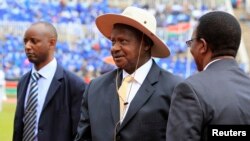Ugandan President Yoweri Museveni’s ruling National Resistance Movement has given him additional political powers ahead of possible changes to the constitution.
At the NRM delegates conference in mid-December a monumental shift took place. More than 10,000 delegates assembled in Kampala approved a motion allowing the party chairman, President Museveni to appoint or dismiss party leaders. Prior to the conference, the NRM elected leaders by popular vote.
In less than a week, the president used those powers and the NRM announced a shakeup in the party’s top offices. First to go was the man who presented the biggest challenge to Museveni: NRM Secretary-General Amama Mbabazi, who had been dismissed as prime minister months earlier. The treasurer, deputy treasurer, deputy secretary general, and electoral commission chairman also were replaced as well.
Silver Kayando, a lawyer who worked on the NRM legal committee for the conference, said the consolidation of power was a good move to make politics more efficient.
“NRM is a political party desirous of maintaining its political power and rule. So if they've deemed it fit that the party chairman having more power is what will deliver them victory, to maintain their hold on power, so be it. Power is there to be exercised, and the party chairman in my view should have power. ... Right now, politically, Museveni is stronger. He displayed a lot of political genius. He was able to play his cards right,” said Kayando.
The consolidation of party power comes at a crucial time.
The Uganda Law Reform Commission is currently reviewing a number of proposed amendments to the Constitution, including allowing the government to seize land for investment purposes.
This comes ahead of Uganda’s plan to award new oil and gas exploration licenses in 2015, after a seven-year moratorium. The discovery of gas and oil reserves has led to an increase in land disputes and claims.
Other proposed constitutional changes would allow the president to direct police policies and make it tougher for members of parliament to shift political alliances.
This is not surprising, given the recent history of swift crackdown on political opponents - including the repeated jailing of Kizza Besigye, a former presidential candidate.
President Museveni is a former rebel leader who has been in power since 1986. He has won four elections in the past 20 years, but critics say that is because he stacked the deck. The last election in 2011 was widely criticized as flawed.
So it is not surprising to human rights activists that one of the proposed constitutional amendments not being considered is the restoration of term limits. The two-term limit was scrapped in 2005 by constitutional amendment, allowing the president to run for his third and fourth terms. At the same time, restrictions on political pluralism were also put in place.
Livingstone Sewanyana of the Foundation for Human Rights Initiative said he believed the latest move to increase the president’s powers was to counter early any possible challenge ahead of the 2016 elections.
“The mere fact that all the powers were conferred to only one person to choose and elect the other leaders within the party would be worrying, in the sense that it symbolizes how governance will be effected in this country. Yes, I would say it raises a fundamental issue, as to the extent to which power is shared ... and the freedom in which citizens can make choices. ... Of course, our concern is that we need to have a level playing field as we go toward 2016,” said Sewanyana.
Museveni’s 28 years in power make him of one Africa’s longest serving leaders, on a continent that has close to a dozen “presidents for life.”
The presidenty has not officially announced his candidacy for a fifth term, but it seems clear that the NRM is setting the stage for another term in office for Museveni. An official announcement is expected to come in the next six months.




